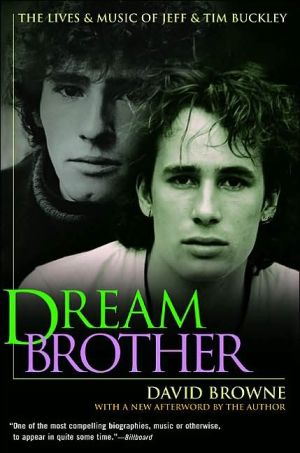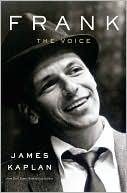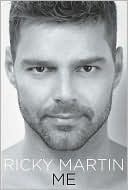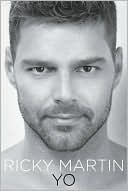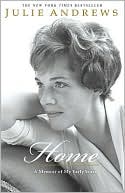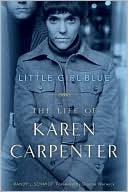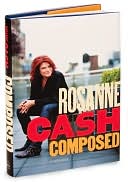Dream Brother: The Lives and Music of Jeff and Tim Buckley
When Jeff Buckley drowned at the age of thirty in 1997, he not only left behind a legacy of brilliant music — he brought back haunting memories of his father, '60s troubadour Tim Buckley, a gifted musician who barely knew his son and who himself died at twenty-eight. Both father and son made transcendent music that mixed rock, jazz, and folk; both amassed a cadre of obsessive, adoring fans.\ This absorbing dual biography — based on interviews with more than one hundred friends, family...
Search in google:
When he accidentally drowned in May 1997, Jeff Buckley was on the edge of pop stardom, with an acclaimed album under his belt and another one on the way. His live appearances had been hailed as revelatory and he was considered a gifted, melodic composer whose passion and talent brought dynamism to the singer-songwriter form Eerily, his father, Tim Buckley, an innovative musician who had only just begun to receive commercial success, had also died suddenly—from a drug overdose&@151;in 1975. The father and son had lived apart from each other, yet they shared and ineffable musical genius.Jeff Buckley was only 30 years old when he died, outliving his father's age at death by just two years. With the power of a novel, Dream Brother explores the lives of these two gifted musicians, drawing a remarkably clear picture of the parallel music eras (the '60s and the '90s) in which they worked and elucidating the forces that led to their tragic deaths.About the Author:David Browne is a staff music critic at Entertainment Weekly. Prior to that he was the staff music reporter for the New York Daily News. In 1996, he won the Music Journalism Award for excellence in criticism. He lives in New York City. Onion Essential and engrossing...a remarkable job.
Chapter One\ My grandfather had a beautiful voice. Irish tenor. Beautiful. Too much of a military hardass to deal with his own and his son's talents. I wish it were otherwise. I love you, you poor bastards.... With a father like this man, it is no wonder that Tim Buckley was afraid to come back to me. So afraid to be my father. Because his only paradigm for fatherhood was a deranged lunatic with a steel plate in his head.... I know that he must have been scared shitless to think he might possibly become like his father. Scared shitless of treating me the way his father treated him and his family. Can you imagine the heartbreak? The useless, shitty torture day in, day out?\ -- JEFF BUCKLEY, JOURNAL ENTRY, AUGUST 9, 1995\ \ \ As centuries went, the eighteenth was not a particularly desirable one in which to be Irish in Ireland. The island was on its way to becoming absorbed into the United Kingdom, and the British Penal Laws drawn up between 1702 and 1719 had planted the seeds for the muzzling of native Irish culture. One law in particular made it illegal for the Irish to study and practice their own language, Gaelic, and their own traditions within their own borders. For the Irish people, the Laws were demoralizing and degrading, and they led the populace to devise increasingly covert ways to school their children in, among others, Gaelic. Illicit instructors began teaching in whatever ramshackle structures could be found- in old barns and ditches, behind the ruins of walls, even behind hedges that would hide both teacher and pupils. The latter practice gave rise to the term "hedgemaster", which came to apply to any and all of theseillegal practitioners of Irish tradition.\ Among the hedgemasters was at least one member of the Buckley clan, said to be from county Cork in the southwestern part of the country. According to family lore, the Buckleys were already known around Cork's sloping, green-blanketed valleys for their skills as storytellers and troubadours. As hedgemasters, they now added authority defiers to their reputation. Along with their fellow educational rebels, they consciously spat on the law of the land in order to carry on the dying and suppressed culture of their own people. The hedgemasters- and the Buckleys- would do things their way.\ Among their own dubious achievements, the British Penal Laws also forced thousands of Irish to flee Ireland and settle elsewhere, and some landed in the industrial towns of upstate New York. By the early twentieth century, a descendant of one of the hedgemasters- the first Timothy Charles Buckley- and his wife, Charlotte, were living and working in one of those areas: Amsterdam, a factory town twenty miles northwest of Albany. The Mohawk River sliced through the small city, but that feature was far from its most notable. Sixty-two plants clogged the streets of Amsterdam, which was populated primarily by working-class Irish, Polish, Germans, Russians, and Italians. In the proud words of its chamber of commerce, Amsterdam was "first in the manufacture of brooms" in the nation; its factories also churned out rugs, carpets, underwear, gloves, and pearl buttons, among dozens of other everyday products. (It was also the producer of actor Kirk Douglas, born there as Issur Danielovich in 1916.) Tim Buckley had an auto repair service in town with his partner, Frank Graff, but Buckley & Graff did not last long, and by 1936, Tim senior was a full-time bartender and dwelled with his family on Mechanic Street near the Chuctanunda Creek. The Mechanic Street address was merely one of many; every year, the family would relocate to a new home.\ The Buckleys' initial attempt at a family failed when their first child died shortly after birth. In November 1916, eighteen-year-old Charlotte finally bore a healthy child, a son named Timothy Charles Jr. Tim Jr. graduated high school and, by age twenty, was working in the local movie theater, the Strand, on the city's bustling, fume-choked East Main Street, near the Sears Roebuck and Penney's stores. In 1939, he took a job at the Bigelow-Sanford Carpet Company ("America's style leader for over 100 years," boasted its advertisements). However, World War II altered whatever plans Tim Jr. had for his life. He had already enlisted in the National Guard in December 1937, and was placed on active duty on October 15, 1940. Then, on May 25,1942, he was drafted and assigned to the 101st Airborne. He was twenty-five.\ Even under the circumstances, it was a daunting assignment. The newly activated 101st trained and prepared soldiers for an innovative form of postindustrial warfare, parachute combat; their unofficial name, the Screaming Eagles, testified to the ferocity and intensity of their mission. Tim spent four weeks in parachute school at Fort Benning in Georgia before he and his fellow dogfaces shipped out for the European theater of operations on September 5, 1943, eventually participating in campaigns at Normandy, Ardennes, northern France, and the Rhineland. Tim's outfit was originally part of companies B and D of the 502nd Parachute Infantry Regiment- a quarter to a fifth of whom were killed in action. Tim was later transferred to ground duty as part of the 105th Infantry, Company G. In the 502nd, his official title was sergeant, but his unofficial moniker was a "demolition specialist," who, in the Army's words, "destroyed by means of explosives, such objects of military importance as bridges, roads, buildings, and railways to delay enemy action."\ As with many of his fellow soldiers, Tim arrived back in America only after the war ended-on Christmas day 1945, first to Fort Dix, New Jersey, and then to Washington, DC. Judging by the slew of medals he brought back with him, including a Distinguished Unit Badge, a Bronze Star, and a Good Conduct Medal, Tim seemed a solid, honorable soldier.\ Dream Brother. Copyright © by David Browne. Reprinted by permission of HarperCollins Publishers, Inc. All rights reserved. Available now wherever books are sold.
\ From Barnes & NobleThe Barnes & Noble Review\ Jeff Buckley's drowning in 1997 was proclaimed a tragedy, not only because the 30-year-old singer-songwriter was perched on the cusp of stardom but also because his death so eerily mirrored the premature demise of his father, folk-rock icon Tim Buckley. In Dream Brother, music critic David Browne offers an incisive portrait of the ill-fated father and son, examining their deaths and their short, though accomplished, careers. Browne's keen reporting and strong sense of the complex relationship between Jeff and Tim Buckley create a gripping account of a young artist hurtling toward his own destruction and a lyrical story of two lives adrift on the same churning river. Too discerning to simply attribute Jeff's death to some otherworldly, shared destiny with his father -- who died in 1975 at 28 -- the author instead paints a compelling picture of two valuable artists who never should have left the world so early. Dream Brother avoids dwelling on the similarities between father and son, but its focus on their individual paths makes the coincidences all the more haunting. \ Despite looking and sounding uncannily like a man who came a generation earlier, Jeff Buckley did not embrace his father's legacy. As Browne points out, the son was already without his father long before Tim's fatal heroin dose. For the rest of his life, Jeff resented his father for his absence and rejected the drug habit and self-destructive lifestyle that had ensnared Tim. And yet, both father and son possessed a daring that led them to premature, accidental deaths.\ Painting vivid images of the art and business of music in two very different eras, Dream Brother makes it clear that the common thread linking the deaths of Tim and Jeff Buckley is a sense of profound loss -- youth cut short, talent unexplored, music extinguished.\ Indeed, pervasive throughout Dream Brother is the feeling of something seductively ethereal. Maybe it's the presence of the Wolf River, which lured Jeff to his death. Maybe it's the foreknowledge of how the story will end. But probably, long after the Buckleys are gone, it's the music they left behind. (Karen Burns)\ \ \ \ \ \ Fred GoodmanDavid Browne's Dream Brother is more than an investigation into the eerie double tragedy of Tim and Jeff Buckley: It is a meditation on the power of our deepest desires to both sink and save us. By reconstructing the fablelike story of a father and son who spent just one week together but walked the same lost highway to its unknowable end, Browne shows how rock and roll has become our way of trying to grow up and grasp the American dream.\ \ \ David HajduLike its subjects, Dream Brother is smart and beautiful, it defies category, and it leaves you in a state of exhilarated unease. David Browne has written much more than a rock bio; this is music literature.\ \ \ \ \ Bruce FeilerDavid Browne is not only one of the most knowledgeable music writers in America, he's also one of the liveliest. Dream Brother is a masterly feat of reporting, a poignant cross- generational saga, and a fascinating portrait of the family tragedies inherent in much of rock history.\ \ \ \ \ BillboardFascinating...one of the most compelling biographies, music or otherwise, to appear in quite some time.\ \ \ \ \ OnionEssential and engrossing...a remarkable job.\ \ \ \ \ E! OnlineHaunting, plaintive...a provocative picture of father and son.\ \ \ \ \ Library JournalFather and son Tim and Jeff Buckley earned a place in rock lore as soulful troubadours who died too young. In 1975, the elder Buckley died of a drug overdose, while Jeff drowned in the Mississippi River in 1997. Both were on the brink of some commercial success, and their story has remained untold until now. A music critic for Entertainment Weekly, Browne offers an engaging chronicle of the late musicians, using a segmented time line to illustrate the eerie similarities between their lives. This account--particularly the last third, which feverishly alternates between the physical demise of both father and son--will rivet even cursory music fans. While Browne does incorporate technical descriptions of the Buckleys' music, he crafts two accessible biographies that highlight the ironic commonalties between a father and son who barely knew each other. Highly recommended for public libraries.--Caroline Dadas, Univ. of Illinois Urbana-Champaign Copyright 2000 Cahners Business Information.\ \ \ \ \ Kirkus ReviewsA furiously detailed, deeply smitten biography of father and son musicians Tim and Jeff Buckley, from Entertainment Weekly music critic Browne. Tim Buckley was a 1960s musician who blended folk, jazz, art song, and rhythm and blues with"a tenor as clear and untainted as Irish air." He attained cult status but was too gratingly experimental to capture a wide audience. That he was self-obsessed and obnoxious—"No, I don't play that anymore. If you don't like it, get the hell out of here," he would suggest to old fans—didn't help either. Though Browne is clearly taken with Tim's music, he doesn't try to buff his rotten behavior, or tidy up his neglect of abandoned son Jeff. Jeff also turned to music, partly as a way to get free from a miserable home life, Browne suggests, and he was just as wide-ranging as his father and had a voice"as big as a cathedral." While the father played the failed, misunderstood artist, the son cultivated the look of"a sullen male chanteuse who sang as if he were older, wiser, and more heartbroken than he appeared." Reading here, it is very hard to get a sense of why these two men so absorb Browne when they come across as ditsy and irresponsible: Tim willful to the point of bitterness and Jeff waffling and erratic. Browne's music critiques are flabby (of Jeff's one album:"Grace seemed to float above the earth, scouring the landscape for spiritual fulfillment") and the details can overwhelm (is it important that Jeff briefly rented a house with a red stucco roof?). That father and son died young is tragic, but doesn't add up to a compelling story. Buckley fans will be pleased by the fruits of Browne'shungryresearch—but others may be leftto wonder what all the fuss was about.\ \
